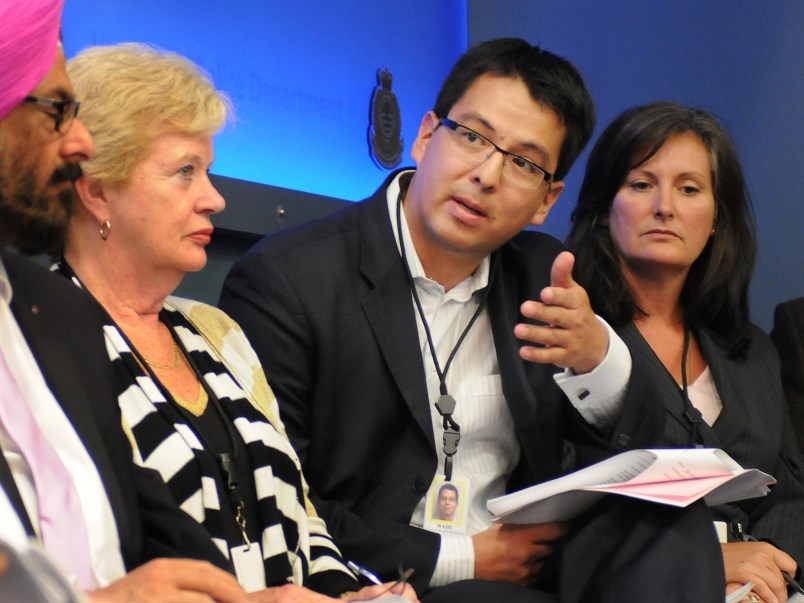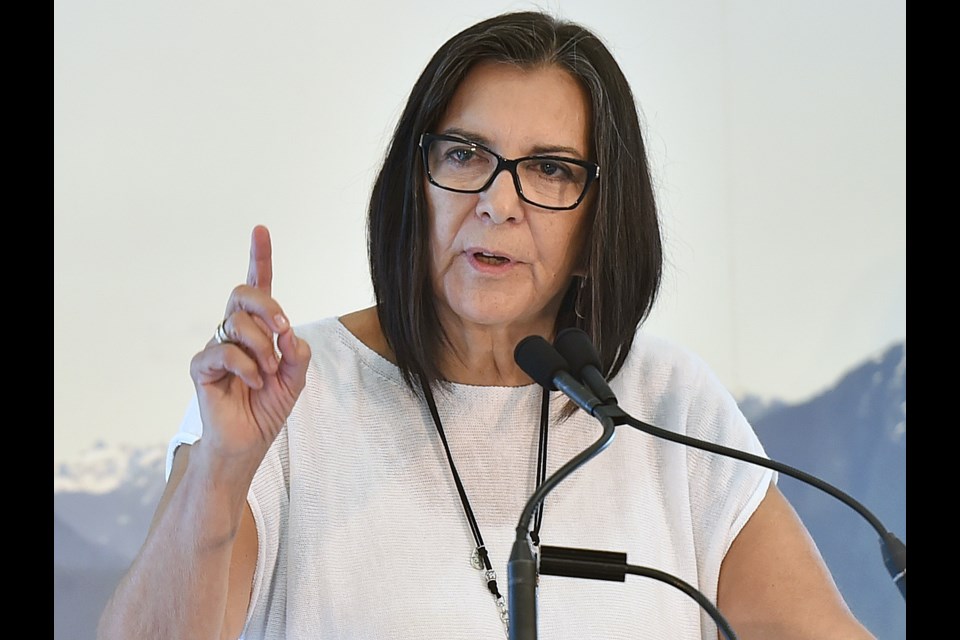A former chief of the Musqueam Indian Band who has been a powerful voice for women and Indigenous rights will be sworn in Thursday as the newest member of the Vancouver Police Board.
Wendy Grant-John, who served three terms as chief and is a current band councillor, will be the city’s lone representative on the eight-person board chaired by Mayor Kennedy Stewart.
The other members are appointed by the provincial government.
Grant-John made it clear that her work on the board will not be solely focused on representing Musqueam people and their concerns.
But, she added, issues affecting the Indigenous population in the city will be high on her agenda, as will giving a voice to all marginalized and vulnerable citizens.
She pointed to the level of homelessness and drug addiction in the Downtown Eastside—where statistics show Indigenous people are overrepresented—as areas to explore further with police.
“It’s from there where I’m coming from,” said Grant-John, noting she accepted the appointment to the board after being asked by city councillors Melissa De Genova and Christine Boyle.
Boyle said in an email to the Courier that Grant-John is a thoughtful and courageous community leader, who brings a wealth of experience and expertise to the board.
Grant-John becomes a member of the board at a time that an independent consultant is reviewing the Vancouver Police Department’s “street check” practice.
Boyle mentioned that in her email, saying “I’m confident that Wendy Grant-John will bring valuable insight to this topic and many other issues of public safety and community well-being. I am grateful for Wendy’s willingness to take on this role.”
The consultant’s report on the practice of street checks was expected to be completed in July, but the board’s website now indicates it won’t be done until the end of the year.
An update on changes the VPD has made to its street check policy is expected to be heard at the board Thursday.
In May 2018, the VPD posted data to its website that showed an overrepresentation of Indigenous and black people being stopped by police officers.
According to the VPD’s 2017 guidelines, the definition of a street check is when an officer stops a person to conduct an interview or investigation in regards to suspicious activity or a suspected crime.
The Union of B.C. Indian Chiefs and the B.C. Civil Liberties Association suggested the practice was discriminatory, which the VPD disputed in a 62-page report released in September 2018.
Grant-John wasn’t aware of the board’s decision to hire an consultant to review the issue, but said she was keen to hear the findings.
“I’d be very interested in the report, for sure,” she said, sharing her own story about police officers’ interaction with a man in Dunbar about five years ago.
She said the incident involved a panhandler, who was likely impaired by drugs or alcohol. Grant-John said police were “kind of disregarding him as a human being.”
“I stopped and said they shouldn’t be treating him this way because he was in distress,” she said.
Grant-John has a long history in the city as a leader in her community and across the country, including being the first woman elected Regional Chief to the Assembly of First Nations.
As chief of the Musqueam, she helped negotiate one of the first Aboriginal commercial fisheries in Canada. She previously worked as associate regional director general of B.C. with Indian and Northern Affairs Canada.
Grant-John served as a commissioner on the Pacific Salmon Commission and was founding member and director of the Aboriginal Healing Foundation.
Her current role with the band is chair of intergovernmental affairs, where she works with her son Wade, a former police board member who joked that his mom was “following in his footsteps.”

Wade, who is acting chief of staff for the Musqueam band council, served on the board from 2010 to 2014 after being appointed by the provincial government.
He mentioned the same issues his mother did as being important to him, including how police are handling the huge volume of calls related to people in a mental health crisis.
“I told her it was a tremendous opportunity to have her own voice around the table to help shape the police force at a policy level,” he said of his mother’s appointment.
“Somebody that has lived in the city and has seen the city grow up and seen the relationship between Indigenous people and the police and the city itself—she’s going to bring a positive voice to the table.”
Grant-John’s appointment now gives the board two Indigenous voices. Claire Marshall, who is Mi’kmaq from the Millbrook First Nation in Nova Scotia, has served on the board since June 2014.
Over the years, other members of the Indigenous community, including First Nations leader Jerry Adams, have served on the board. But Grant-John’s appointment marks the first time a former chief has been appointed.
Although she is known publicly because of her work in the Indigenous community, it’s her role as a mother, grandmother and great grandmother that Grant-John said she is most proud.
“It’s not just about negotiating with the government, or being part of the business development in the city of Vancouver,” she said.
“None of that rates at the level of being a mother, a grandmother and great grandmother, and to help the next generations be contributing, positive citizens—not just of Musqueam, but the city itself.”
Grant-John, who is married to prominent First Nations leader Ed John, will be sworn in at 1 p.m. at the VPD’s Cambie Street precinct.
@Howellings



